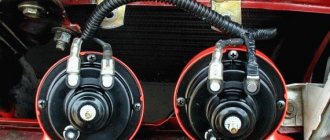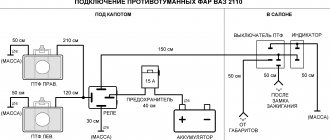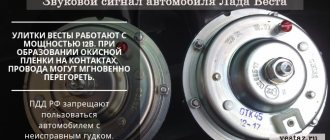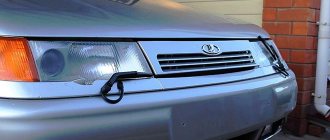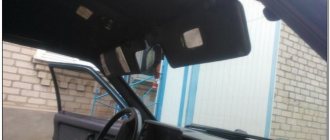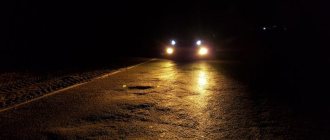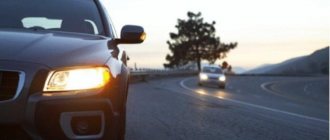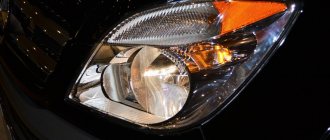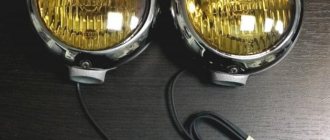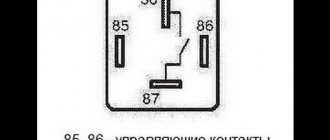Fog lights are designed to generate a flat and wide stream of light directed above the road surface. This direction of the light beam allows minimizing illumination of the volume of fog in thickness and improves visibility from the driver’s seat. Failure to follow the rules and wiring diagram for fog lights when installing them yourself can lead to accidents.
Requirements for installing fog lights
It is permissible to locate fog lamps directly in the headlights.
The rules for installing headlights are regulated by two regulations:
- GOST 8769-75 or SEV standard 4122-83;
- state standard of the Russian Federation GOST R 41.48-2004, corresponding to UNECE Rules No. 48.
Location of fog lights on a car
The general requirements are as follows:
- The installation location is located at a distance of no more than 400 mm from the side surface of the vehicle body. The distance is measured between the side plane and the outside of the headlight.
- It is permissible to install only two fog lights. The standards separately stipulate the mandatory installation of fog lights on tourist buses, as well as on vehicles operated on mountain roads.
- The lower edge of the fog lighting device is located at a distance of at least 250 mm from the road surface.
- Fog lights should have a horizontal viewing angle ranging from +15º to -10º, and a vertical viewing angle from +45º to -10º. It is unacceptable to block the headlights with vehicle parts within the specified angles.
- Fog lights must be connected in parallel with side lights.
- The lenses of the fog lamps must produce a beam of light located below the flow given by the low beam lamps.
- It is acceptable to use transparent filters or selective yellow color. It is unacceptable to use glass of different colors on the same car.
The standards do not have special requirements for installing fog lights on a car, so the owner can install the kit himself.
What will you need to install fog lights?
To install fog lights yourself, a minimum set of tools is required. The car owner must have knowledge and skills in working with electrical wiring, since the safe operation of the car as a whole depends on the correct installation.
- color electrical diagram of the car;
- nippers or side cutters;
- wire cleaning knife;
- terminal crimping pliers (terminal block);
- soldering iron
Set of materials required for installation:
- a set of fog lights suitable for installation in standard holes in the bumper or universal ones that are mounted on the surface of the bumper;
- stranded copper wire with a cross-section of 1.5-2 mm² with insulation capable of operating at low temperatures and resistant to gasoline and oil vapors;
- relay for turning on (standard headlight turn-on relays from front-wheel drive VAZ models are usually used);
- remote housing for installing a blade fuse;
- 30 A blade fuse;
- a control key that matches the interior design (preferably with a backlight);
- connectors and terminals for connecting wires to circuit elements;
- heat shrink tube of suitable diameter;
- electrical tape on a polyethylene or fabric basis;
- plastic ties;
- automotive corrugated hose for laying wires.
Set of fog lights for Ford Focus 3
Connection diagram
For installation, two connection schemes for fog lights are possible:
When connected in parallel, the positive wire goes to each headlight from the relay contact. Power to the relay is supplied through a fuse link with a rating of 15 A, which is enough for most models of fog lights. It is advisable to place the fuse as close to the battery terminal as possible.
The +12V signal voltage should appear only when the ignition is active. This measure prevents the headlights from working when the engine is off. If desired, you can automatically ignite the headlights after turning on the ignition. To do this, the signal wire is connected to the battery charging indicator lamp installed in the instrument cluster. The button must be on.
Parallel connection
Serial connection reduces current consumption and lamp brightness. A similar scheme is used to use fog lights instead of standard headlights.
How to install and connect with your own hands?
Installing fog lights on your own begins with developing a connection diagram. A properly designed circuit avoids unnecessary wires and ensures reliable operation of the electrical circuit. It is recommended to carry out installation work in the garage, although many owners install it outdoors.
Installing PTF in the front bumper and setting it up
There are three installation methods:
- into standard openings;
- on the outer bracket;
- into a blank bumper not intended for installing headlights.
The setup is done using the homemade template presented below. The template is installed perpendicularly at a distance of 5 m from the car headlights. The adjustment is made until the top edge of the light spot coincides. The matching line is located 100 mm below the height of the center of the lamps.
Approximate view of the template for customization
Adjusting your fog lights increases driver visibility and reduces the risk of blinding oncoming drivers.
Installing PTF in a blind bumper
The most difficult and time-consuming option is to install fog lights in a solid bumper (i.e., one that does not have factory holes for this):
- Remove the bumper from the vehicle in accordance with the repair and operating instructions.
- Determine the optimal location for installing headlights in terms of housing shape and compliance with regulations.
- Make a hole for the headlights. The best way is to drill holes around the perimeter and saw through the gaps with a file. The hole must be adjusted to ensure proper fit between the body and the decorative frame. Small fragments of the bumper are carefully cut off with a construction or stationery knife.
- Drill holes for the fog lamp housing, which is secured with suitable bolts.
- Install the headlight into the housing and mount the protective cover. It clings to the plastic of the bumper.
- You can adjust the headlight using a special key included in the kit.
Installing PTF on the external bracket
Option for mounting foglights on a steel bracket:
- Mark the mounting points of the bracket on the bumper in accordance with the requirements for installing fog lights. As a rule, additional headlights are installed on the bracket.
- Screw the bracket to the bumper with self-tapping screws or bolts.
- Install the fog lights on the mounting points and connect the wiring.
Example of installing headlights on a bracket
Installation of PTF in standard openings
In order to install headlights in a bumper that has standard plugs, you must:
- Raise the front of the car by placing a wooden block 150-200 mm high under the wheels. For greater convenience, you can place the car on a lift.
- Remove the protective shields covering the lower part of the bumper.
- Unscrew the clips of the standard bumper plugs.
- Insert the fog lamp into the guides and secure with standard screws. When using non-original headlights, there may be discrepancies in dimensions and mounting points. In this case, you have to adjust the parts to each other. Below is a photo gallery of installing Chinese fog lights in the Hyundai Elantra HD bumper.
Wiring
When pulling and installing wiring, you must follow the following safety rules:
- disconnect the battery;
- the cross-section of the wire must correspond to the current carried;
- connection points must have reliable contact;
- Only wires of the same material can be connected (to reduce electrochemical corrosion);
- It is advisable to shed the twists with solder;
- the junctions of the wires are insulated with heat-shrinkable tubing or electrical tape;
- Avoid placing wiring connections in areas prone to flooding;
- to protect them from bending and chafing, it is recommended to protect them with a split corrugated tube;
- the wires are laid parallel to the standard harnesses and fixed to them with plastic ties;
- The power supply circuit for the fog lights must be protected by an individual fuse;
- When laying the wire, you should ensure that there are no hot or moving elements in the path, as well as sharp edges.
Neglecting the rules for safe installation of electrical wiring leads to overheating of the circuits and a fire, which can destroy the car.
Before starting installation, it is recommended to assemble the future electrical circuit and test the operation. This event allows you to find and eliminate errors made during development.
Wiring and headlight testing
PTF selection
First, determine the location of their installation on the car. Often, foreign cars have niches on the bumper for installing additional lights. Then the fog lights are selected so that their shape and size correspond to these niches in the bumper.
Important! The quality of performance of PTF functions is practically not affected by their power. Therefore, it is advisable to choose low-power light sources - LED lamps.
On SUVs, PTFs are installed at the level of conventional headlights or on the roof of the car. In this situation, PTFs of any size and shape are suitable. The main thing is that they are equipped with brackets that provide reliable fastening.
The main difference between fog lights is the lamps used in them. There are the following types of PTF:
- Halogen. The most affordable option. The downside is the low lifespan compared to other types of lamps. Before you buy these headlights, make sure that you can easily replace them when they break down.
- LED. Their main advantages are durability and efficiency. The downside is the price. If LED headlights are not installed correctly or are poorly ventilated, their lifespan will be shortened.
- Xenon. Pros: good technical characteristics. Such models are durable and effective. The downside is the high cost.
Video
The wiring diagram for installing fog lights is shown in a video filmed for the “Car Lover” channel.
When installing fog lights via a relay, a car owner may experience some difficulties. It seems that everything is clear with the installation of the headlights themselves and the laying of the wires, but how to connect the relay and connect everything along with the fuses. To do this, it is advisable to have minimal knowledge in electrical engineering.
Preparing to connect the fog lamp relay
Tools required to connect the relay:
You will also need a large number of consumables, such as electrical tape, clamps, terminals, heat shrink, and corrugation. These materials will ensure the connection of the wires and their durability during use.
Advantages of functional lighting equipment
Fog lights allow you to partially relieve the strain on the driver's eyes during a forced trip in difficult weather conditions. With their help, it is possible to achieve better illumination of the road surface. The greatest importance of headlights lies in the precise supply of light, which determines the illumination of the road.
Precisely adjusted devices illuminate up to 10 meters of space in front of the car, which is quite enough for safe driving in difficult weather conditions. Of course, for this you will need to adhere to a certain speed limit. The headlights are adjusted during the installation of the equipment. The quality of road lighting depends entirely on the setting of the angle of incidence of the light flux.
Connection diagram for fog lights via relay
Before starting installation, you need to decide on the connection diagram:
Autonomous, the fog lights will turn on independently, although then the headlights can drain the battery completely, which is fraught with problems. Connection occurs to the positive dimensions or ignition wire +ACC
Watch the video below to see how to properly connect the relay.
With the ignition, in this case, the fog lights cannot be turned on without the engine running, usually the plus from the ignition switch or IGN2 is used, which is best looked for using a voltmeter, since if you use a lamp probe, there is a possibility of damage to the car's electronics.
P O P U L A R N O E:
Solar battery for charging your phone
Of course, it would be nice if the phone was charged or at least partially recharged from a solar energy source. For some reason, phone manufacturers don't produce self-charging phones. But there is still a phone (Samsung E1107) that, under ideal conditions, can be fully charged from the sun in 55 hours. It’s a pity that so-called ideal conditions do not exist everywhere.
A solar power plant is a modern way to supply electricity to our home. The question of using alternative energy sources arises for many people. And this is not surprising, because the constant rise in electricity prices makes us think about this more and more often. So the question arises: why not use free, inexhaustible natural resources - wind, sun, water? Let's talk today about solar energy, or more precisely about a solar power plant.
Previously, we published charger diagrams for car batteries.
Today we will look at several schemes using the widely used specialized MS TL494.
The charger discussed below is assembled according to the circuit of a key current stabilizer with a unit for monitoring the achieved voltage on the battery to ensure that it is turned off at the end of charging.
Safety and comfort are the main qualities worthy of the attention of a car owner. If you care about yourself and each passenger, choose a fully equipped vehicle. Fog lights are not a mandatory component of the car: manufacturers often ignore this functional and useful element, wanting to reduce the cost of the cars they produce as much as possible. How to install and adjust fog lights will be discussed below.
